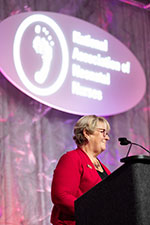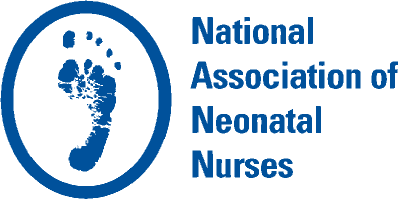Board Update
 Joan Rikli, MBA MSN RN CPNP-PC NE-BC
Joan Rikli, MBA MSN RN CPNP-PC NE-BC
NANN President
Racial Disparities in NICUs: Not in My Unit?
Many of us strongly believe that all infants cared for in our neonatal intensive care units (NICUs) are treated equally. Each infant receives the same quality of care, one that promotes the best possible outcomes. We believe we are unbiased. We tout family-centered care and are proud of our support groups, cuddler programs, and wrap-around services. However, emerging research is showing that these beliefs are naïve and incorrect. Racism impacts outcomes for babies across the country in urban and rural settings, in large and small units, and perhaps in your own NICU. In a recent review of data collected from around the country, it has been clearly demonstrated that black infants have a death rate more than twice that of white or Hispanic infants, and significant morbidities are higher in the black and Hispanic groups as well (Howell et al., 2018). Even accounting for geographic differences, this disparity in outcomes exists within individual NICUs. What is contributing to this inequity, and what can we do about it?
Three different contributors to health disparities for neonates have been described in the literature (Beck et al., 2019):
- Increased risk for preterm birth. Challenges faced by the mother—such as poverty, lack of access to prenatal care, poor nutrition, violence, and discrimination—influence her pregnancy outcome. The preterm birth rate for black infants is 14.1% compared to 9.1% for white infants and 9.7% for Hispanic infants (Martin, 2019).
- Lower quality of care. Minority infants more often are born in institutions where the nurse to patient ratio is higher. These NICUs also have a higher incidence of missed care activities, lower breastfeeding rates, and higher infection rates (Horbar et al., 2019). In addition, differences in the application of evidence-based practices for different racial and ethnic groups within individual units have been noted, resulting in poorer outcomes (Profit et al., 2017).
- Socioeconomic disadvantages in infancy and childhood. The impact of social determinants of health not only contribute to preterm birth but also influence the long-term health outcomes of NICU graduates (Beck et al., 2019).
What can an individual NICU nurse do to change this alarming picture? This complex issue seems overwhelming to tackle. However, there are concrete actions that each of us can take to promote positive outcomes for all infants in our care.
- Start a conversation in your unit about this topic. What biases do we have regarding certain ethnic and racial groups? Although we may think we care for each infant in an equitable way, do we care for their parents in an equally supportive manner? If parents look, act, or behave differently than we do, is the result a reluctance to take that assignment, with subsequent inconsistency in care? Do we encourage breastfeeding and offer support to all families we encounter?
- Look at your unit’s data. If you participate in the Vermont Oxford Network, they soon will be reporting your unit’s outcomes by race as well as gestational age and weight.
- Regularly access interpreters when caring for families who don’t speak English. Relying on other family members to interpret for parents may contribute to misinformation and a lack of appropriate education. Attempting to communicate through gestures or pictures is not enough.
- Search out training around cultural competence and recognizing unconscious bias. Many institutions provide such education through their human resources department.
- Evaluate the documentation standards in your electronic medical record. Is screening for stressors in the parent’s environment included? Such screening should include: Is their housing secure? Do they have adequate food and access to health care? Is their home environment safe from violence? If these questions aren’t asked and action not taken, we are not providing adequate discharge preparation or transition to home. We need to ensure families are connected to resources in their community to increase their likelihood for success; consider early intervention programs, food pantries, legal aid, and housing assistance programs. Our responsibility for ensuring a baby and family grows and thrives can’t end the day they leave the NICU.
- Involve families in quality improvement activities in your unit. Seek out diversity and those who bring different perspectives. Ask for their ideas and input on ways care can be delivered more equitably.
- Advocate for improvements in your hospital and community. Connect with hospital administrators, community leaders, and elected officials to educate and advocate for resources that positively impact the social determinants of health.
This is an important topic and a focus for NANN in the years ahead. Consider how you may contribute to eliminating racial and ethnic disparities in your NICU and beyond. I welcome your comments, suggestions, and feedback.
References
Beck, A. F., Edwards, E. M., Horbar, J. D., Howell, E. A., McCormick, M. C., & Pursley, D. M. (2019). The color of health: How racism, segregation, and inequality affect the health and well-being of preterm infants and their families. Pediatric Research. Retrieved from https://doi.org/10.1038/s41390-019-0513-6.
Horbar, J. D., Edwards, E. M., Greenberg, L. T., Profit, J., Draper, D., Helkey, D., … Firebaugh, G. (2019). Racial segregation and inequality in NICU care for very low birth weight and very preterm infants. JAMA Pediatrics, 173(5), 455-461.
Howell, E., Janevic, T., Hebert, P. L., Egorova, N. N., Balbierz, A., & Zeitlin, J. (2018). Differences in morbidity and mortality rates in black, white, and Hispanic very preterm infants among New York City hospitals. JAMA Pediatrics, 172(3), 269-277.
Martin, J. H. (2019). Births in the United States, 2018. Hyattsville, MD: National Center for Health
Statistics.
Profit, J., Gould, J. B., Bennett, M., Goldstein, B. A., Draper, D., Phibbs, C. S., & Lee, H. C. (2017). Racial/ethnic disparity in NICU quality of care delivery. Pediatrics, 140(3), e20170918.


